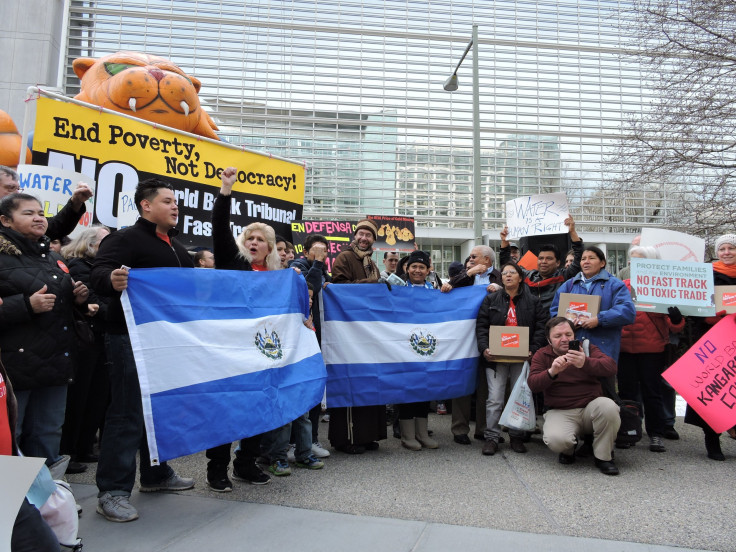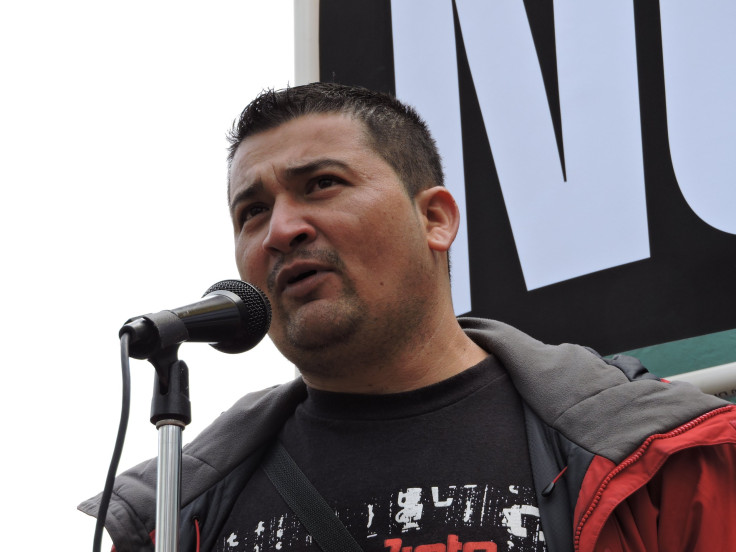
El Salvadorian activists traveled to D.C. this week and protested on March 19th against a lawsuit brought against their government by OceanaGold’s mining company Pacific Rim. The lawsuit aims to recoup over $300 million in potential lost revenue after the company failed to obtain a mining permit. The case is being heard at the World Bank’s International Centre for Settlement of Investment Disputes (ICSID). NGOs including Oxfam claim that the lawsuit is an undemocratic attempt to force El Salvador to allow unsafe mining conditions which would hurt water quality.
The lawsuit comes as 11 countries, including the U.S., Japan, Peru, Australia and others consider Trans-Pacifica Partnership free trade agreement. The deal is far-reaching and touches on a lot of issues: net neutrality, healthcare costs, environmental degradation, and labor conditions are just a few of the areas of concern. As we wrote in a March 3rd article, the TPP has come under fire in the U.S. for the provisions on Investor-State Dispute Settlement (ISDS), a type of international corporate arbitration similar to the ICSID.
If you’re trying to understand how TPP’s would work, the World Bank’s ICSID is a rough sketch, a beta-test of ISDS arbitration. In other words, what will the world look like if the Trans Pacific Partnership is passed in its current form?
This Is What Happened In El Salvador
As the Latin Times’ Susmita Baral explained last September:
"[Oceana Gold subsidiary] Pacific Rim filed a complaint against El Salvador in 2009. In 2012, the ICSID ruled that the case could proceed under El Salvador’s foreign investment laws—laws which have since been amended to prevent international companies from bypassing Salvadoran courts.
“Officials said that Oceana Gold’s subsidiary, Pacific Rim] failed to meet three key legal requirements for a mining permit: It failed to get government approval for its Environmental Impact Study (EIS); It did not submit a required feasibility study; and it was not even close to meeting the requirement that it held titles to (or permission to mine in) all the land for which it requested a concession.
“[OceanaGold] lobbied for a new mining law that it wrote and that would eliminate regulatory requirements it couldn’t meet. Having failed to push the law through, OceanaGold bypassed El Salvador’s democratically-elected government and initiated international arbitration to pressure El Salvador to pay for lost exploration costs and future profits.”
Environmental And Human Rights Concerns Of TPP
“We are a country of corn and beans. It’s our life. Mining will damage water and agriculture,” said Vidalina Morales de Gámez, 56, in a phone interview with the Latin Times the day before the protest. Morales de Gámez is a long-time agricultural activist from Santa Marta.
Its exactly this kind of dispute that caused concerns for liberal lawmaker Elizabeth Warren because it weakened national sovereignty. Like the OceanaGold case, trade disputes under ISDS would not be heard in the countries of the plaintiffs or the defendants, but a corporate court. Here’s an excerpt from my article.
“Imagine that the United States bans a toxic chemical that is often added to gasoline because of its health and environmental consequences,” Warren wrote [....] “If the company won, the ruling couldn’t be challenged in U.S. courts, and the arbitration panel could require American taxpayers to cough up millions — and even billions — of dollars in damages.”
For activists in El Salvador, Warren’s hypothetical is very, very real. In the messy environmental dispute, the conflict has spilled into the arena human rights as well. Activists told the Latin times that they recieved death threats for commenting on the case. (They did not specify if they suspected OceanaGold or Pacific Rim’s involvement in the threats).

.
“When I was working at Radio Victoria, we received many death threats for talking about the [Pacific Rim] case,” said Elvis Zavala, 33, also of Santa Marta. “From 2010 on I had to leave my home because of the threats. I got threatening letters, emails, and phone messages.” Zavala, head of a Radio Victoria production team, has a seven-year old daughter. (Again, he didn't speculate as to who sent the threats, nor did he implicate OceanaGold).
Economic Concerns Of TPP-Like Trade
Looking of his daughter's future, Zavala argued that mining wasn’t good for El Salvador’s economy anyway.
“Mining provides only a few jobs, for a few people,” Zavala said. “And most of those are highly trained [foreign] workers.” He doesn’t think that any policy should incentivize mining, whether it’s international trade agreements or domestic policy. His colleague agreed
“Now they’re saying that mining will help poverty. How can they make this argument in a country like ours?” Morales de Gámez said.
Even neoliberal economists agree with Morales de Gámez and Zavala that TPP-style free trade is harmful, though for slightly different reasons. The conservative Cato Institute argues that trade disputes arbitrated in the ISDS unfairly subside multinational corporations. Again, from our March 3rd article:
“ISDS amounts to a subsidy to mitigate the risk of outsourcing. While outsourcing shouldn’t be denigrated, punished, or taxed – companies should be free to allocate their resources as they see fit – neither should it be subsidized.”
If OceanaGold wins their $300 million in the World Bank’s ICSID court, that’s exactly what will have happened. Not only will they get a bailout on the risk they took to do business in a complicated emerging market (a reported $77 million in exploration investment), but they’ll get an additional $233 million just for intending to do business. That $300 would come from one of the smallest government budgets in the Americas, up to 5 percent of El Salvador’s annual spending, depending on how you calculate it.
OceanaGold acknowledged but did not respond to a request for comment from the Latin Times as of publication time.
Legally speaking, El Salvador may have dug its own grave. It created the legal framework by which OceanaGold could sidestep the country’s laws, and made itself beholden to a foreign corporate court. It’s not that there aren’t logical arguments for free trade deals like CAFTA (and the associated El Salvadorian legislation) or the Trans-Pacific Partnership. Yet El Salvador’s experience can show that TPP could have unintended consequences in terms of environmental damage and economic return.
© 2024 Latin Times. All rights reserved. Do not reproduce without permission.